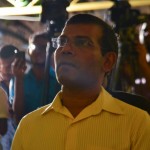The Maldives’ judiciary continued to dominate headlines this week, in particular the Supreme Court’s decision to use privileged Majlis testimony in its case against the Elections Commission.
Citing the establishment of justice as a fundamental tenet of Islam, the court declared the evidence admissible in its ongoing contempt of court case.
Speaking at a campaign event for the Majlis elections, Maldivian Democratic Party (MDP) leader Mohamed Nasheed suggested the Supreme Court was fearful of an MDP majority in the parliament, pledging judicial reform should this happen.
On the lower benches, televised claims of bribery within the judiciary by Civil Court Judge Aisha Shujoon prompted both the Anti Corruption and the Judicial Services Commissions to launch separate investigations.
The JSC’s investigations into Shujoon’s claims will take place without the Majlis’ representative MP Ahmed Hamza, however, who has been removed as a result of his standing for re-election.
The Human Rights Commission this week called upon the Majlis to expedite the appointment of a new Prosecutor General (PG), before the Criminal Court finally agreed to accept new cases from the Deputy PG.
The court was immediately presented with 20 new cases, although the PG’s Office has said the backlog will take a month to clear. This may hamper new court regulations which requires the office to file criminal charges within 45 days of arrests being made.
The court did find time this week to sentence MDP MP Abdulla Jabir to one year’s imprisonment for failure to provide a urine sample to police in late 2012.
Three more cases are likely to land on the PG’s desk in the next six weeks after police arrested two Bangladeshi men and one woman in Malé for pre-marital sexual relations. For those recently married foreigners, however, the Maldives continues to be the number one holiday destination, an online poll revealed.
Fears were raised by the Tourism Employees Association that the amount of service charge disbursed to resort workers was being reduced as the government plans to raise taxes on the industry. An IMF delegation in the country noted its surprise at the resilience of the economy, suggesting that taxes on the industry were still relatively low.
The new nominee for the governor’s position at the central banking authority suggested that increasing local productivity and reducing reliance on imports – on which 75 percent of the country’s dollars are spent – was vital.
During the SAARC Council of Ministers’ Meeting – hosted on Bandos resort – President Abdulla Yameen stated his belief that trade and commerce were the “magic wand” for achieving the regional association’s goals.
Earlier in the week, while campaigning for the Progressive Party of Maldives, Yameen had labelled the Nasheed government’s transport policy corrupt, vowing to reclaim land given to private companies for ferry services.
He also said that the government would not be seeking to expedite Nasheed’s trial, though he did suggest that the former president must be sentenced for the arrest of Judge Abdulla Mohamed in 2012 if the rule of law is to be upheld.
The police’s campaign to reach out to the nation’s youth continued this week with the third ‘Blues for Youth’ camp. Home Minister Umar Naseer told participants that there was “no task too menial or lowly for a Maldivian”.
Meanwhile, Naseer signed an order shutting down Malé’s Dharumavantha Rasgefaanu mosque after an unauthorised congregation had prayed for the government’s destruction.
As Yameen’s administration approaches the one hundred days’ milestone intact, the policy to provide greater access to healthcare was introduced in Villinigili – albeit on a more modest scale than initially promised.
In nearby Gulhi island, a pioneering desalination project was launched by the UK’s Aquiva Foundation. The project – a joint venture with STELCO – will produce drinking water using the excess heat from electricity generators.
Further north, Alifushi island council has complained that emergency drinking water supplied to the island arrived contaminated with dust and bacteria.
Finally, the Olympic Committee this week announced plans to increase female participation in sports, setting a target of 33 percent of contingents sent to major international games to be women.
 (0)Dislikes
(0)Dislikes (0)
(0)




